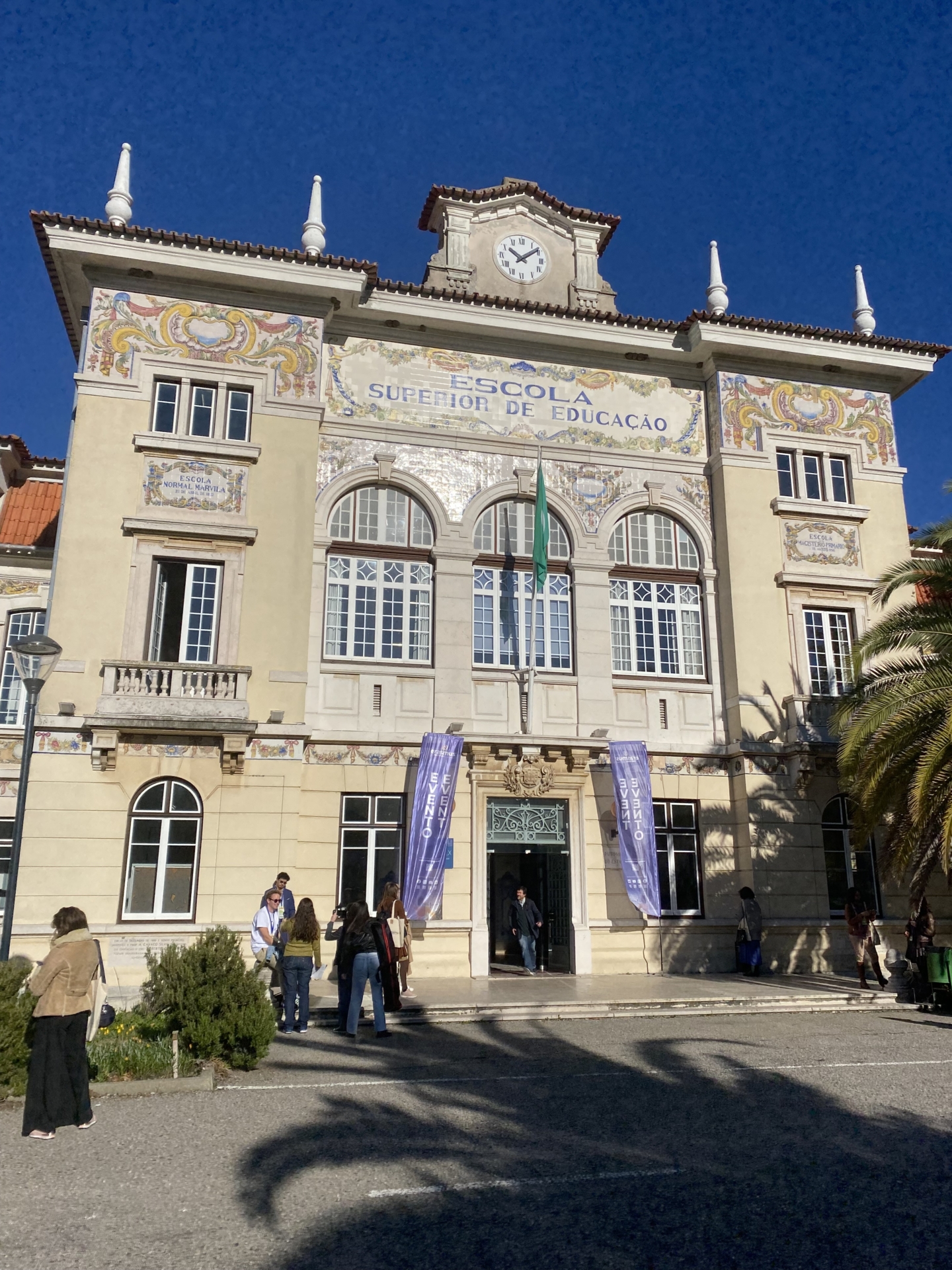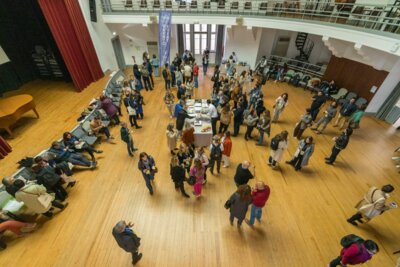Unity in Diversity - Participation at the TCA in Lisbon
Unity in Diversity: A Diversity, Equity & Inclusive Celebration through Erasmus+ mindset
From 22-24 November 2023, a TCA - Transnational Cooperation Activity took place in Lisbon at the invitation of the EU National Agency in Portugal.
Our non-profit inclution.org is currently involved in a bilateral partnership on the topic of inclusive vocational education and training with Turkey (V.IN.E). From our national agency NABIBB we heard about an Erasmus+ event in Lisbon in November. We took part at this call for participation and applied for a place. Together with three other experts from Germany, we became part of an exciting 2.5-day conference. A total of 52 participants from 15 EU countries took part. Many teachers of primary and secondary education, but also civil society actors, representatives of other EU national agencies and adult educators, all united by the idea and conviction for inclusive education.
Presentation of inclusive best practice in Portugal
The Portuguese National Agency hosted the event at the Escola Superior Educacao Lisboa from 22nd to 24th of November. After the welcoming words of the director Ana Cristina Perdigao, 12 examples of good practice, divided into 3 panels, were presented to us.
The commitment of the municipality of Fundao was particularly striking. The mayor, Paulo Fernandes, reported a sharp drop in the number of young people leaving Portugal. The main reason is not unemployment (as in Spain, for example) but poor wages. On the other hand, his municipality is seeing an increase in refugees, especially from African countries. They have launched several participation programmes to involve the new arrivals from the outset and enable them to participate.
The "Theatre in Prison" project also had a strong impact. Taking people in their crises and misdemeanours first and giving them a second chance - art makes it easier to achieve this. Luisa Pinto's performances are always mixed, with professional artists performing alongside prisoners. The audience is not given a clue in advance. Meeting people without prejudice - theatre makes it possible.
The inclusive culture festival "Open House Lisboa" takes place annually in Lisbon. It focusses on inclusive access, guided tours, inclusive art and culture. The city's architecture is fascinating, but its historical foundations harbour many physical barriers. How to deal with them? A conscious discussion and dialogue with users is a good start. Filipa Tomaz, herself an architect, has developed a tactile book on architecture for children and runs the Lisboa Architecture Triennale.
Mental illness and artistic creation - the artist and director of the Manicomio project spoke about this. He described his personal learning process about his personal approach to people who were and are undergoing treatment in hospital. From distance, mixed with arrogance, to respect and participative opening of art spaces that no longer differ whether they are occupied by "disabled" people or not. Sandro Resende has redefined who learns from whom, not only for himself personally, but for everyone who comes into contact with his collective of artists.
Closing remarks were spoken by the Secretary of State for Inclusion Mrs Ana Sofia Antunes. Afterwords, three Roma musicians played Portuguese and Spanish songs for us and got us in the mood for a culinary evening. At Restaurant I was able to chat to two vocational school teachers from Portugal and France. The shift to the right in Europe worries us all. What can schools do about it? And how can we reach young people who are not critical of the media? Education is more than imparting specialised knowledge. We all agree on that. The four Cs of education in the 21st century (OECD) resonated - communication, creativity, co-operation and critical thinking.
Workshops, dialogue, brainstorming
What connects us? We started the second day with an exercise. We lined up in the room and made short personal statements. This was followed by a workshop with the artists from Casa da Imagem on the gender-sensitive use of photography as a medium of representation. They gave us access to their archive of photos of everyday life in Portugal in the 1930s. Working in groups, we recreated the motifs and examined whether the representation of gender still works in this way today. The localisation with Portuguese folk culture pointed to the diversity of cultures in Europe. And yet the exercise made it clear how important a critical examination of folk art and folk culture is for our inclusive societies.
In the afternoon, we formed working groups. After a brief introduction to the topic of inclusion by the Portuguese NA, we tried to develop EU project ideas and describe concrete goals. In our group, we mainly discussed the challenge of reaching educationally disadvantaged families. How can schools form an intact community with all families? Because many parents stay away from school, do not take part in school events and are difficult to reach - reported a head teacher from Greece. A school counsellor from France reported that many people have to pull together so that vulnerable young people can continue their education - teachers, school authorities, parents, social workers from youth welfare offices and more. Creative, individualised solutions are needed. Schools, with their rigid rules and expectations, create barriers for students with disabilities, migrant youth or temporarily vulnerable young people. How can we overcome them? What methods and practical examples already exist? EU project work helps us to re-evaluate and rethink our own structures and geographical spaces.
We spent the second evening in a fish restaurant with Portuguese folk music "Fadu".
The TCA concluded with a short presentation on communication. We worked in groups on the Sustainable Global Goals and explained them to ourselves in simple terms. We used the time to exchange contacts and ideas for potential collaboration. Our inclution will start with KA1 training on social inclusion and diversity skills for teachers in Berlin in 2024. I was able to discuss this idea with several school headmasters and compare it with their needs. We feel encouraged to advance the topics of inclusion, anti-discrimination, critical thinking and inclusive digitality.
Thanks to the dedicated employees of the National Agency in Portugal. They have organised a great event. The network of participants is very valuable and I wish we could have networked more. I hope that many ideas and projects can emerge from it anyway. The challenges in education are huge.
More information about the event and photos: https://erasmusmais.pt/destaques/tca-diversity-inclusion/
Stana Schenck
4.12.2023
Fotoserien
Unity in Diversity/ TCA in Lisbon (DI, 05. Dezember 2023)
Unity in Diversity - Transnational Cooperation Acitivity of Erasmus+ in Lisbon 22nd-24th of November 2023
Urheberrecht:






















Escola Educacao Lisboa
Registration
Escola Educacao Lisboa
Bird perspective on the conference room at the break time of the event
Registration of participants at the entrance to the Escola Educacao Lisboa
1st day of the event
Theater in Prison
View to the audience of the first day of the event
Tactile Book on Architecture
Reskilling and Upskilling
View of Lisboa
Dinner - 1st evening
Welcome to the 2nd day
Info Pack
Wheel of Power and Privilege
DInner - 2nd evening
Train Station of Rossio
Lecture on Communication
Group work
DInner - 2nd Day
German Delegation of NABIBB
Good bye Escola Educacao!
